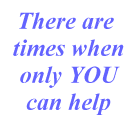Just Being There
—— Craig Bourne
Don’t professionals know better than
we
just how to help a person?
I hope many of you watch the television situation drama
“Seventh Heaven”. It is a show that is well worth watching
regularly and is about a minister, his wife and their seven children.
An old episode was rerun recently in which the 14-year-old daughter,
Lucy, is devastated by the death  of
a classmate and friend of hers in an automobile accident.
of
a classmate and friend of hers in an automobile accident.
Lucy feels that she is to blame for the girl’s death for multiple reasons (that’s what much of the story was about) and she is unable to release her feelings enough to even cry. Her parents are quite concerned about finding a way for her to be able to face her grief and begin to move through it.
We see Lucy and her older sister, Mary, sitting at opposite
ends of a bed in the room they share, each doing their own reading.
 Finally
Mary said, “I wish I could help you in some way.” Lucy responded
to Mary that she WAS helping, just by being there with her.
Finally
Mary said, “I wish I could help you in some way.” Lucy responded
to Mary that she WAS helping, just by being there with her.
Mary said, “Wouldn’t you like me to get Mom and Dad for you? Dad’s pretty good at dealing with this kind of stuff.” To which Lucy said, “He’s a professional! I don’t want to talk to a professional!”
Why do you suppose Lucy didn’t want to talk to a professional? Don’t professionals know better than we just how to help a person? Haven’t they been trained to know the answers and to provide the proper assistance?
 Without
doing some serious research, we can at least discuss the “professionalism”
of caring in an anecdotal form. We know that in centuries past, it was
the family who took care of each other, whether it be physical or emotional
issues. How did they do it? How did they know WHAT to do? The answer
is that they didn’t — but they did it anyway. The excuses are very familiar
to each of us: “I don’t know what to say”; “I’m not good at
that sort of thing”; and “I can’t deal with stuff like that.”
But they had no choice — there was no one else to turn to.
Without
doing some serious research, we can at least discuss the “professionalism”
of caring in an anecdotal form. We know that in centuries past, it was
the family who took care of each other, whether it be physical or emotional
issues. How did they do it? How did they know WHAT to do? The answer
is that they didn’t — but they did it anyway. The excuses are very familiar
to each of us: “I don’t know what to say”; “I’m not good at
that sort of thing”; and “I can’t deal with stuff like that.”
But they had no choice — there was no one else to turn to.
More recently, we have seen that there is less “caring” that goes on inside the home. There are multiple reasons: Doctors no longer make house calls. Women have joined the work force so that they are not at home to fill their previous role as caregiver / caretaker / care provider. Caring is “farmed out”, even from infancy, with baby sitters, day care centers, nursery school, pre-school, etc. For the elderly we have retirement homes, assisted living facilities, nursing homes, hospice, etc. And because these facilities are licensed and regulated, and staffed by “trained” people, we have come to view them as more capable than ourselves.
Going back to our story, why would Lucy NOT want assistance from someone who is trained and experienced, as opposed to her sister—a sister who doesn’t have much more life experience than she herself? And here we have the important question to consider: Does the “professionalism” of a trained person sometimes not seem personal enough? Does it lack the intimacy that the hurting person desires?
 Remember
that “90% of helping is just showing up.” Our friends and family are
helped more by our being there than any training we might have. In most
cases, the needy one doesn’t want “expertise” — he or she wants support.
Remember
that “90% of helping is just showing up.” Our friends and family are
helped more by our being there than any training we might have. In most
cases, the needy one doesn’t want “expertise” — he or she wants support.
Don’t let your lack of experience be an excuse to avoid responsibility and involvement. Don’t underestimate the importance of your role. Don’t leave things up to “those who are trained” to do it better.
There are times and places where only YOU can serve, because of your friendship or relationship. You can help a person where a “professional” would not be as effective.
Or, in other words: Show up! Be there! Listen! Weep, or rejoice, or put your arms around them and say nothing. But most importantly, let the hurting one share his or her emotions with you.